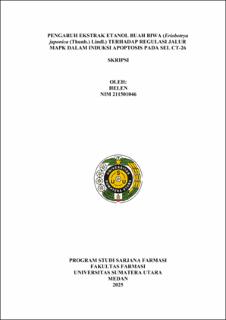Pengaruh Ekstrak Etanol Buah Biwa (Eriobotrya Japonica (Thunb.) Lindl.) terhadap Regulasi Jalur Mapk dalam Induksi Apoptosis pada Sel CT-26
Ethanol Extract of Biwa (Eriobotrya Japonica (Thunb.) Lindl.) Fruit Induces Apoptosis via Regulation of MAPK Signaling Pathways in CT-26

Date
2025Author
Helen, Helen
Advisor(s)
Syahputra, Rony Abdi
Kim, Bonglee
Metadata
Show full item recordAbstract
Background: Colorectal cancer is the top three leading causes of cancer-related deaths globally. The MAPK pathway plays a critical role in regulating apoptosis, proliferation, and migration, making it a potential target for cancer therapy. The ethanol extract of biwa fruit (EEBB) contains bioactive compounds that act as pro-apoptotic and anti-proliferative. However, studies investigating the mechanism of EEBB on the MAPK pathway in colorectal cancer cells remain limited. Objective: To investigate the effect of EEBB on MAPK pathway modulation and its mechanisms in inducing apoptosis in CT-26 colorectal cancer cells. Methods: Western blot analysis was conducted to assess protein expression changes in key MAPK components: p-JNK1/2, p-ERK1/2, and p-p38. CT-26 cells were divided into three treatment groups: untreated control, EEBB 50 µg/mL, and EEBB 100 µg/mL. β-actin was used as housekeeping. Results: Fold change analysis showed altered protein expression. The expression of p-JNK1 and p-JNK2 increased significantly (p<0.05) at a concentration of 100 µg/mL, reaching 1.21±0.02 and 1.11±0.04, respectively. p-ERK1 decreased to 0.72±0.03 and 0.52±0.002, while p-ERK2 decreased to 0.70±0.03 and 0.67±0.01 at 50 and 100 µg/mL. Meanwhile, p-p38 increased to 1.29±0.01 (50 µg/mL) and 1.25±0.03 (100 µg/mL). The treatment also led to increased inhibition of cell viability and a significant reduction in wound closure.
Conclusion: EEBB at 50 and 100 µg/mL modulates MAPK signaling in CT-26 cells by enhancing JNK/p38 activation and suppressing ERK phosphorylation. This results in increased pro-apoptotic signaling and reduced anti-apoptotic activity, supported by its cytotoxic and anti-migratory effects, ultimately promoting apoptosis in colorectal cancer cells.
Collections
- Undergraduate Theses [1833]
